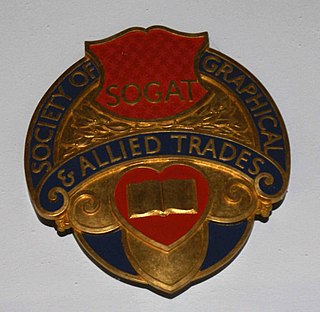Related Research Articles
In British politics, an affiliated trade union is one that is linked to the Labour Party. The party was created by the trade unions and socialist societies in 1900 as the Labour Representation Committee and the unions have retained close institutional links with it.

The Transport and General Workers' Union was one of the largest general trade unions in the United Kingdom and Ireland – where it was known as the Amalgamated Transport and General Workers' Union (ATGWU) to differentiate itself from the Irish Transport and General Workers' Union – with 900,000 members. It was founded in 1922 and Ernest Bevin served as its first general secretary.

The Society of Graphical and Allied Trades (SOGAT) was a British trade union in the printing industry.

The Ceramic and Allied Trades Union (CATU) was a trade union representing pottery workers in the United Kingdom.

The Irish Transport and General Workers Union (ITGWU), was a trade union representing workers, initially mainly labourers, in Ireland.
The National Amalgamated Union of Enginemen, Firemen, Mechanics, Motormen and Electrical Workers was a trade union in the United Kingdom. It represented stationary engine drivers and cranemen in a wide variety of industries, as well as less skilled workers in the electrical industry and miscellaneous workers.
The National Union of Gold, Silver and Allied Trades (NUGSAT) was a trade union in Britain and Ireland. It represented workers in precious metals, jewellers, diamond polishers, electroplaters, watch and clock repairers and dental technicians.
The Wire Workers' Union was a trade union in England which existed between 1840 and 1991. It represented workers involved in the manufacture of wire.
The National Amalgamated Furnishing Trades Association (NAFTA) was a trade union representing workers involved in making furniture in the United Kingdom.

The Manchester Trades Union Council brings together trade union branches in Manchester in England.
The Building and Allied Trades' Union (BATU) is a trade union representing workers in the construction industry and furniture trade in Ireland.
Alexander Gossip was a Scottish trade union leader and political activist.
The General Council of the Trades Union Congress is an elected body which is responsible for carrying out the policies agreed at the annual British Trade Union Congresses (TUC).
The National Union of Furniture Trade Operatives (NUFTO) was a trade union in the United Kingdom representing furniture makers.
The Amalgamated Society of Tailors and Tailoresses (AST&T) was a trade union representing tailors in the United Kingdom.
The Irish National Union of Vintners', Grocers' and Allied Trades Assistants (INUVGATA), also known as the Barmen's Union, was a trade union representing retail and bar staff, principally in Ireland.
The Amalgamated Union of Upholsterers (AUU) was a trade union representing upholstery workers in the United Kingdom.
The Amalgamated Society of Enginemen, Cranemen and Firemen was a trade union in the United Kingdom. It represented stationary engine drivers and cranemen in a wide variety of industries.
Robert Saul Shube was a British trade unionist and cabinetmaker.
Lewis Leckie was a British trade union leader.